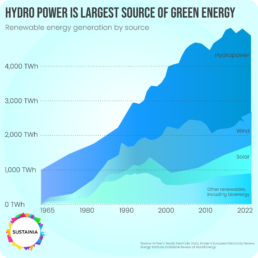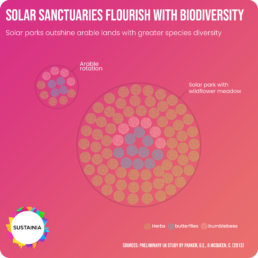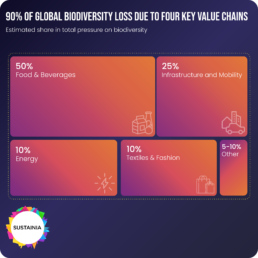Sustainia Simplifies
From Water to Watts

From Water to Watts – Why Hydropower Dominates
Hydropower, often referred to as hydroelectric power or simply hydro, is one of the oldest and most effective renewable energy sources on our planet. Its greatness lies not just in its capacity to generate electricity, but also in the multitude of benefits it brings to the energy sector, environment, and society at large.
So in the pursuit of sustainable energy solutions, hydropower stands out as a reliable and efficient option. Let’s explore the advantages of hydropower, taking into account its efficiency, responsible water management, cost-effectiveness, and sustainability implications.
Advantages of Hydropower
Water Management and Conservation: Hydropower projects involve responsible water management, which supports conservation efforts, mitigates droughts, and ensures water availability downstream.
Reliability: Hydropower provides a consistent and dependable source of electricity, enhancing grid stability and energy security.
Sustainability Implications: Hydropower’s low greenhouse gas emissions align with sustainability goals. Modern projects prioritize minimizing environmental impacts.
Longevity and Storage: Hydropower infrastructure is durable and can serve as a means of energy storage, improving grid flexibility.
Cost-Effectiveness: While initial investments can be substantial, hydropower’s long lifespan and low operating costs contribute to its cost-effectiveness over time.
Hydropower vs. Other Renewables
Efficiency: Hydropower excels in efficiency compared to wind and solar.
Reliability: Hydropower offers a consistent power source, whereas wind and solar are intermittent.
Environmental Impact: Hydropower’s impact can be managed, while wind and solar have lower operational impacts.
Resource Availability: Hydropower requires specific water resources, limiting its geographical scope. Wind and solar are more versatile.
Water Management and Conservation: Hydropower uniquely integrates water management and conservation efforts. Wind and solar have no water-related benefits.
Longevity and Storage: Hydropower infrastructure has a longer lifespan and provides storage capabilities, enhancing its grid integration.
There are challenges, too
However, like any other energy source, hydropower has its challenges, including environmental concerns related to aquatic life, potential displacement of local communities, and the massive initial infrastructure cost.
Ecologically, dams can disrupt aquatic ecosystems by obstructing fish migration, altering water temperatures, and trapping sediment, potentially harming river life. Large reservoirs sometimes emit methane, a potent greenhouse gas, due to decomposing organic matter. On a socio-economic front, the creation of reservoirs can displace communities, devastate local habitats, and pose water security issues for areas downstream. Moreover, the high initial infrastructure costs, potential for reservoir-induced seismicity, and aesthetic alterations to natural landscapes are concerns. As such, careful planning and sustainable practices are imperative to harness hydro energy responsibly.
Nonetheless, with continued advancements and careful management, hydropower remains a key player in the transition to a more sustainable energy future. Hydropower presents a compelling option in the realm of renewable energy due to its efficiency, reliability, and sustainability aspects. Its responsible water management practices and cost-effectiveness make it an appealing choice for a greener energy future. In a comparative analysis with other renewable sources, hydropower demonstrates unique strengths, positioning itself as a valuable contributor to a more sustainable and resilient energy landscape.


